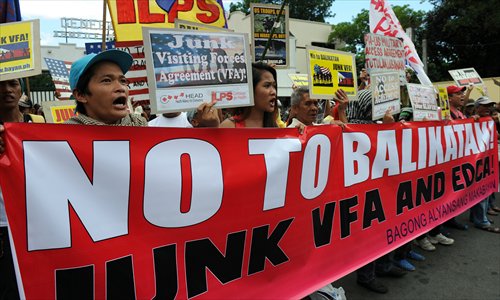US-Philippine war games eye opponents in S.China Sea

Protesters opposing the US-Philippine joint military exercise hold a rally in front of the military headquarters while the opening ceremony was being held in Manila on Monday. Thousands of US and Philippine troops will participate in the annual exercises. Photo: AFP
Some 5,500 troops from the United States and the Philippines began their annual joint drill in Manila on Monday.
The 10-day drill, starting a week after the two countries signed the Enhanced Defense Cooperation Agreement to allow a greater US military presence, were necessary to deal with the challenge of "aggressive" neighbors intent on "changing the status quo," according to Filipino Foreign Secretary Albert del Rosario.
"In recent years tensions in the Asia-Pacific region have increased due to extensive and expansive maritime and territorial claims undermining the rule of law," Del Rosario said at the opening ceremony.
"Aggressive patterns of behavior aimed at changing the status quo threaten peace and stability in the region."
He added that the military exercise, known as Balikatan (Shoulder to Shoulder), with its focus on "maritime capability," boosted the Philippines' ability to "address these challenges."
Chinese foreign ministry spokeswoman Hua Chunying said China hoped that actions by the Philippines and the US were aimed at building regional trust and stability. "Preserving the peace and stability in Asia-Pacific areas is in line with the interests of all parties in the region," she told a regular press briefing In Beijing on Monday.
Beijing has rejected United Nations arbitration and urged Manila to settle the dispute through bilateral talks instead.
About 2,500 US soldiers joined 3,000 Filipino troops in the maneuvers, which began a week after President Obama assured Manila his government was committed to a 1951 mutual defense treaty. The exercises were held in Camp Aguinaldo, in the Philippine capital region of Metro Manila.
"Without doubt, the Philippines has been trying to strengthen its military ties with the US," said Chen Gang, a research fellow at the East Asian Institute of the National University of Singapore. "This act to pander to the US' strategic pivot to Asia will definitely further anger China and hurt the already strained situation over the South China Sea."
Zhuang Guotu, director of the Center of Southeast Asian Studies at Xiamen University, agreed that the military drill that took place right after US President Barack Obama's visit was apparently trying to show to China the two allies' close relationship. The US is also telling other countries around China that the US has strength to be relied upon, he said.
Zhuang suggested China ignore these tricks and deal with relations with neighboring countries in a reasonable manner.
"At a time when US power is in decline, whether its containment of China will work or not remains in question," Zhuang told the Global Times. "The Ukraine crisis may get the US involved and provide a chance for China to improve its relations with its neighboring countries such as Japan and the Philippines."
Dozens of Australian troops including Special Forces are also taking part in the military drill this year as the Philippines seeks to include other key allies in the region.
Looking to raise its regional defense platform, Australia will be bringing P-3 Orion surveillance aircraft to the drills to help boost Manila's "maritime domain awareness," said Wing Commander Nicholas Pratt of the Royal Australian Air Force.
He said the aircraft would be operating out of the western Philippine island of Palawan.
The war games will feature live-fire drills, search-and-rescue operations and humanitarian response scenarios in several locations.
There will also be demonstrations of maritime surveillance systems and ship-to-shore landing exercises on the hosts' west coast facing disputed waters.
Agencies contributed to this story